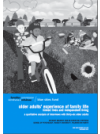This project investigated the ways that older adults in New Zealand experience family life and social relationships today.
Thirty-six interviews were conducted with people aged 55–70 years living in various situations across New Zealand. The interviews were analysed qualitatively using a phenomenological approach, to contribute to understanding of the experience of family life and relationships for older people in the 21st century.
Families were an important connection for most participants, and their importance was not always based on their experience of immediate support, but rather on a sense of permanent ‘blood’ connection. Although family ties were not always uncomplicated, many participants indicated that these ties endured even when contact was not maintained.
Contact with close family members was important to many of the participants, and many maintained contact through international travel and telephone, text and email. Participants also maintained a strong sense of themselves as independent people. This independence was often related to the primacy of the nuclear family and their changing role in this family as they aged. One way that issues of independence were managed was through reciprocity. Participants linked their lives to those of others through acts that benefited both parties, allowing them to feel a sense of connection and to reject the position of dependency.
These ways that older adults experience social connections have important implications. Older adults reflect strong social conventions of independence as well as firm ties to family and community. Policies need to acknowledge older adults’ concerns about independence and their preference for reciprocating help. On a wider scale, social connections could be read as examples of interdependence, rather than via the dichotomy of independence and dependence.
Some participants spoke of the privilege of caring for older parents and the appropriateness of their children caring for them as they age. This reflects a wider understanding of social connections and reciprocity across the lifespan, rather than the moment-by-moment forms of reciprocity.
Purpose
The purpose of this study is to investigate the ways that older adults in New Zealand experience family life and social relationships. This study explored how participants understand particular aspects of their lives as family life, and how they experience being a member of a family in older age.

